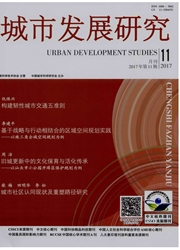

 中文摘要:
中文摘要:
运用符号权力和批判地名学理论,以近代以来福州主城区地名为研究对象,分析不同时代地名命名与变更特点,揭示福州城市地名空间政治变迁规律,对当前城市地名规划管理具有一定的现实意义。研究发现:1地名类型区域差异显著:鼓楼区以体现执政阶层意识形态的事物命名为主,台江区以经济事物类为主,仓山区以景观类为主,晋安区以吉祥愿景类为主;2地名命名与变更呈现去阶层意识形态、求雅求美与商品化的时代演变规律。对宗教事物类地名的扬弃贯穿了整个研究时期,世俗空间与圣神空间的交融、分离对福州地名空间政治建构起到重要作用。3不同时代各社会阶层借助地名表达不同政治立场。当前,资本对城市地名文化重构作用越发显著,地名地方性、时代性和使用权等问题需引起关注。
 英文摘要:
英文摘要:
This research applied the relative theories of Symbolic Power and Critical Toponymy to analyze the naming and changing of the city place-names in main urban area of Fuzhou City at various times with the help of related documents and spatial analysis supported by ArcG IS software. It found that: 1The regional difference of place-name in Fuzhou City was obvious,the place-name of Gulou District were mainly featured with ideology passed by governing class,which of Taijiang District was mainly named by economic activity and object,which of Cangshan District was mainly named by landscape and which of Jinan District was mainly named by good wishes. 2 The whole characteristics of naming and changing trends could be concluded into no-class ideology,refinement and commercialization. Among these trends,the attitude to retain or eliminate such names related to religious things passed throughout the study period,the blending or departure between spaces of the sacred and profane was playing an insignificant role in construct the political space of place-name in Fuzhou City. 3 Place-name became a forum for various social hierarchies to express their political standpoint,to distinguish self and other in political space. Nowadays,capital throws increasingly evident effect on reshaping city placename culture,these issues such as locality,era characteristics and usage power of place-name should be attached more attention.
 同期刊论文项目
同期刊论文项目
 同项目期刊论文
同项目期刊论文
 期刊信息
期刊信息
